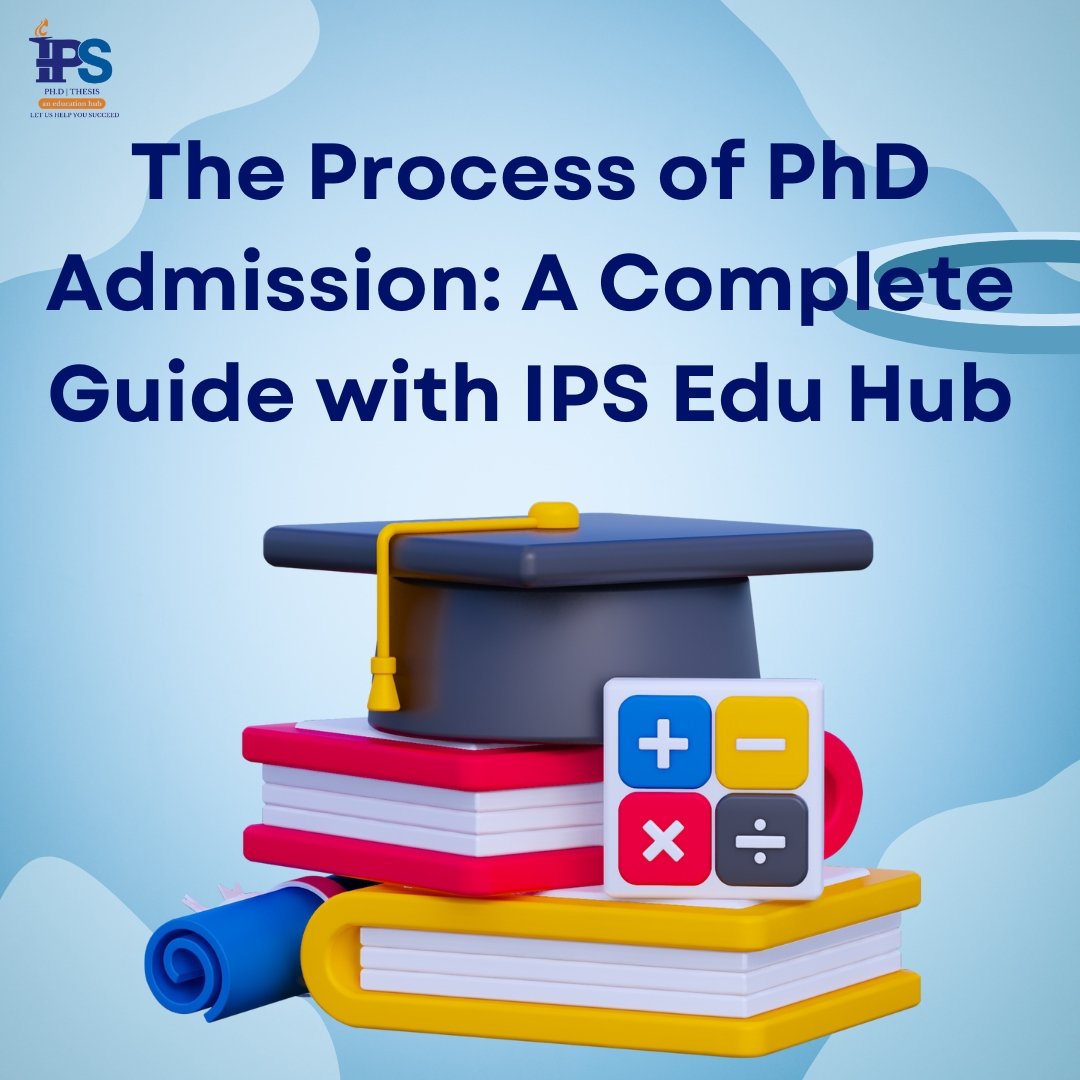
The Process of PhD Admission: A Complete Guide with IPS Edu Hub
Are you planning to pursue a PhD degree and are unsure about the process of PhD admission? The IPS Edu Hub makes it easy for you.
Our IPS Edu Hub scholar resources provide expert guidance to help candidates at every step, from application to enrollment. Knowing the admission process helps you save time and reduce stress. It also enhances your likelihood of securing a PhD position at prestigious universities. Check the full PhD program structure
Why is Understanding the Process of PhD Admission Important?
A clear understanding of the process of PhD admission helps candidates:
- Avoid mistakes that delay admission.
- Prepare strong applications that meet eligibility criteria.
- Plan financials and timelines for full-time or part-time PhD programs.
- Increase your chances of selection through quality research proposals and interview preparation.
The IPS Edu Hub guides scholars in choosing research areas, universities, and preparing documents efficiently.
Step 1: Check Eligibility Criteria?
Before beginning the process of PhD admission, verify your eligibility:
- Candidates must have a relevant master's degree or M.Phil. degree with the required academic scores (typically a minimum of 55 points).
- Some programs accept candidates with equivalent qualifications.
- Working professionals or sponsored candidates may follow experience-based eligibility criteria.
- There are specific guidelines for persons with disabilities under Indian government regulations.
Meeting the eligibility criteria ensures a smooth application process.
Step 2: Choose Your Research Area and Topic?
Selecting a research area is crucial. Consider:
- Alignment with your master's degree or prior research.
- Future career goals and long-term academic interests.
- Availability of supervisors at your chosen Indian institution or abroad.
- Possibility of interdisciplinary research opportunities.
IPS Edu Hub provides expert consultation to help identify suitable research topics. A well-articulated research proposal demonstrates preparation and commitment. Explore our organisational identity
Step 3: List Universities?
Each academic institution has specific rules for PhD admissions. List universities based on:
- Proposed research specialities.
- Reputation and faculty expertise.
- Application deadlines and required documents.
- Access to grants, bursaries, or assistant roles.
Early contact with the admissions office helps keep track of updates and resolve any doubts.
Step 4: Prepare the Research Proposal?
A strong research proposal or statement of purpose is essential:
- Clearly define your research question, objectives, methodology, and expected outcomes.
- Cite prior research experience or publications to strengthen your application.
- Align your proposal with university-specific policies and research focus areas.
IPS Edu Hub guides scholars in crafting compelling proposals that will impress admissions committees. Proceed to the admission portal
Step 5: Recommendation Letters?
Most universities require 2-3 letters of recommendation:
- Choose referees familiar with your academic performance or research skills.
- Recommendations should reflect your ability to conduct independent research.
- Include supervisors, professors, or employers who can vouch for your qualifications.
Strong recommendations enhance the credibility of your application.
Step 6: Submit the Online Application Form?
- Fill out the application form carefully, following the university guidelines.
- Upload the required documents: transcripts, degree certificate, identity card, passport-sized photos.
- Ensure the documents are correct to avoid delays.
- Check the application fee and submission deadlines.
The online application marks the official start of your process of PhD admission.
Step 7: Entrance Exams (if applicable)?
Some PhD programs require qualifying exams, such as:
- UGC-NET, GRE, GMAT, or university-specific exams.
- Assess research aptitude and subject knowledge.
- Part-time and distance PhD programs may have different exam requirements.
IPS Edu Hub provides coaching and mock tests for maximum success.
Step 8: Attend the Interview?
Selected candidates participate in an interview to discuss their research interests:
- The panel evaluates motivation, commitment, and academic readiness.
- Be prepared to confidently explain your research proposal.
- Highlight your previous research experience and publications.
Mock interviews conducted by IPS Edu Hub improve your performance and confidence. Stay updated with new education posts
Step 9: Selection Criteria?
Selection depends on several factors:
- Academic record and Master's/M.Phil. scores.
- Quality of the research proposal and statement of purpose.
- Outcomes in the entrance exam (if required).
- Performance in the interview and overall suitability.
Meeting all requirements increases your chances of admission.
Step 10: Confirm Admission?
After selection:
- Accept the admission offer within the specified deadline.
- Pay the fees and complete registration to secure your seat.
- Some programs require additional documents for sponsored or funded candidates.
- International students must submit proof of English proficiency.
IPS Edu Hub helps candidates complete these steps efficiently.
Additional Tips for a Smooth PhD Admissions Process?
- Start early and plan each step carefully.
- Organise documents and keep multiple copies.
- Research faculty interests at targeted universities.
- Practice interviews and entrance exams.
- Align your long-term career goals with the PhD program.
Following these steps significantly increases your chances of admission.
Challenges Candidates Face in the PhD Admissions Process?
- University selection confusion.
- Weak or unclear research proposal.
- Incomplete or incorrect documents.
- Lack of guidance in preparing for entrance exams or interviews.
- Difficulty managing finances for tuition and fees.
IPS Edu Hub addresses these challenges with expert guidance and scholarly resources.
Frequently Asked Questions (FAQs)
Q1: What is the eligibility for PhD admission?
Candidates must have a Master's or M.Phil. degree with the minimum required marks. Some programs accept equivalent qualifications.
Q2: Are entrance exams mandatory?
Some PhD programs require exams like the UGC-NET, GRE, or GMAT. Other programs may not require these for experienced professionals.
Q3: Can international students apply?
Yes, you need to provide proof of English proficiency and relevant transcripts.
Q4: How long does the admission process take?
Timelines vary by university, typically taking several months, including exams, interviews, and document verification.
Q5: Can working professionals pursue a PhD?
Yes, part-time, remote, or hybrid programs help working professionals balance research and career.
Conclusion: Start your research journey with IPS Edu Hub?
The process of PhD admission may seem complicated, but proper planning and guidance make every step easier. IPS Edu Hub provides expert assistance in:
- Selecting a research topic and preparing a proposal.
- Shortlisting and submitting an application to a university.
- Entrance exam coaching and interview preparation.
- Fee submission, registration, and enrollment assistance.
Start your PhD journey today with IPS Edu Hub. Explore opportunities, realise your academic dreams, and become a successful scholar!
Apply now and secure your PhD seat with IPS Edu Hub. Contact page for counselling





